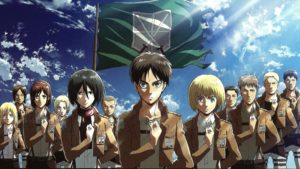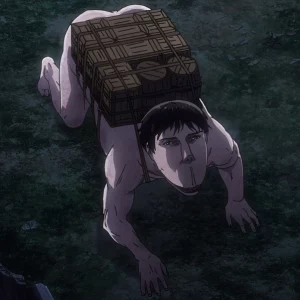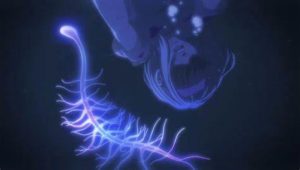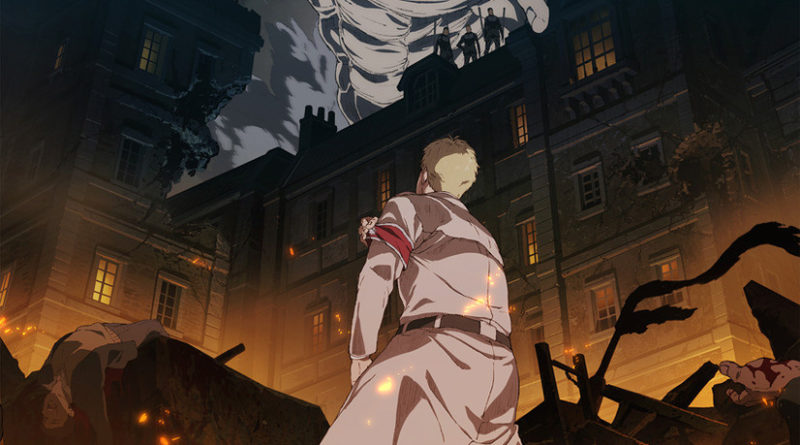Attack on Titan’s Perfect(ly Fine) Finale.
For many years, anime was a disrespected niche in the U.S. It was something people were aware of and watched on occasion, but the art form and its audience were the butt of many jokes, some of which were borderline insensitive. Shows like Dragon Ball and Naruto popularized it, and Avatar: The Last Airbender Americanized it, but even so, it was an art form firmly for kids and nerds.
This changed with the release of Attack on Titan. It was originally released on Japanese network MBS TV, but I remember first hearing of it sometime later when Season 1 was released on Netflix. My mind was absolutely blown, the animation and action were unlike anything I’d seen before or since. I watched almost the whole season in one sitting, entranced by its incredibly unique type of low-fantasy horror, the mysteries of its world, and the rollercoaster satisfaction of watching humanity fight the Titan threat. It also helped that it had the greatest theme song of all time, starting every episode with a blood pumping Germanic war cry. Its quality gave an entire hemisphere permission to take anime seriously.
Just to show you how big this thing was: my dad (who was 43 at the time) was the one who first exposed me to it, and he got so into it that he would geek out with coworkers who were half his age who also loved it. He wore a beanie with the scout regiment logo on it. He had never watched a second of anime before this. You know that “devote your hearts” fist salute they do in the show? My friends and I would do that every day during the pledge of allegiance.

Ten years after this achievement at the beginning of the series, the finale cements an equally monumental one. Attack on Titan is the only media property I’ve ever seen deliver completely reasonable, satisfying answers to all of the questions it set up. I have never seen a story wrap itself up in a neat little bow without feeling cheap or safe. This is true of its entire runtime and is accented in the finale.
That’s not to say the show didn’t have some notable flaws. For one, its pacing was a nightmare. It had a lot of ground to cover in very short seasons, and would waste a lot of time. Half of every episode was characters describing out loud the things we can see on the screen (which is a very common problem in anime, now that I think about it.)
Titans are the coolest power system ever, but had seriously diminishing returns as the show went on, with very disappointing and vague attributes/abilities; “this one’s small,” “this one’s a girl,” “this one’s a… cart? Like a cart you can put things on? It’s a pack mule? That’s its power?”

A lot of issues emerged later on. As the world got bigger and questions were answered, it fell into the classic problem of The Nouns. The Rumbling, The Paths, The Thirteen Year Curse, The Five Year Plan, The XYZ Titan, the different Families and Clans and whatnot. It could be a lot to remember at once, especially with multiple years between seasons– “wait, the what? Oh yeah, right.”
For the first half of season 3, the show was briefly a political thriller entirely contained within the confines of the walls, and this entire arc was unnecessary. This is where the various clans and bloodlines came into play, and it was almost all superfluous. It presented itself as a meditation on the nature of power, but it had absolutely nothing meaningful to say. Although, this arc did give us Kenny the Ripper, so maybe it wasn’t all bad.
These are all forgivable, as they come in the context of, again, the questions and answers it provided. None of them were shocking or super creative, but they made sense and left me satisfied.
Biggest example: Titans are just big people, specifically a race called the Eldians who can turn into them under specific circumstances. Okay, cool. The world actually wasn’t destroyed and overrun with Titans, Eldians were all pushed to an island (Paradis) after a terrible war they started and Titans were sent as punishment. Nobody remembered this because they had their minds erased by their king. Alright, that’s pretty neat.
Early on, we learn that Eren didn’t actually get eaten, he’s a “Titan-Shifter” that can use the power for good. The Colossal, Armored, and Female titans are also shifters, and are actually Reiner, Bertholdt, and Annie, very minor side characters we’d been watching this whole time. This built on our already existing knowledge, and the moment we learned this was when things really kicked into high gear plot-wise. It’s when it becomes Attack on Titan, so to speak.
The most impressive of these answers is the one regarding the state of the world. The main cast finally get to “The Basement” and learn that humanity isn’t on the brink of extinction, in fact it’s thriving, but Eldians outside the walls are being persecuted and placed into ghettos, they even have to wear special armbands to identify themselves in public. Wow, okay, interesting. At this point, the show’s premise shifts from “what if zombies were tall” to “what if blood libel was real.” And I’ve never seen this before, a story folding bigotry into its worldbuilding but neither endorsing nor refuting it. It’s not a perfect WW2 allegory, in fact it’s kind of problematic, but it’s clearly what they were going for. The shift from an apocalypse story to a war story is natural and it properly contextualizes everything that came before.
This all brings me to the finale, which doesn’t provide many explosive revelations, but lands the plane softly. The good guys win and the bad guys lose, and the world is peaceful and safe, but there are nuances that make it more than a simple fairy tale conclusion. For one, I think it rocks that we got to see a flying Titan, that was the obvious fan theory for years and it seemed weird that they didn’t do it until now. Eren eventually becoming the antagonist was the right direction, he was so aggressively noble at the beginning of the series, and it was cool to see him turn on a dime. However, I’m glad they pulled this punch a little bit and revealed that Eren had noble intentions the whole time. He wanted to create a world without Titans, and he did, almost destroying the world in the process. The main conflict is over and most of the current main cast survives, but the main character and 80% of the world is dead and there’s another war with the Eldians on the horizon. The finale also squeezed in some themes about life itself; “we’re not born to die, we’re born to live,” “hold on to the small moments” and so on. Basic, but meaningful.

I mean… yeah. What a good finale. Apparently, some parts were pretty divisive among the fans, particularly the romance angle– at the last minute, Eren admits that he’s in love with Mikasa, he knows it’s mutual, and he wants her to think about him for years after he’s gone. I can understand why people thought this was forced, but I thought it was nice to see the show acknowledge something that was there from the very beginning. Although, one thing I really didn’t like: what exactly was that blue squiggly thing? Earlier in the series, we’re told that by interacting with it, Ymir became the first Titan 2000 years ago (nice nod to Norse mythology right there), but like…is it an alien? Is it magic? It’s referred to officially as the “source of all living matter,” and I can accept that as a title, but it just raises more questions and feels like a weird mystery to preserve.
This show was consistently good throughout its entire run, and I wish it didn’t kill its own momentum by waiting four years between season 1 and season 2. Anime is notoriously difficult and time-consuming to produce, but the show sincerely never recovered from this in terms of popularity. Between this and the bizarre structure of the last season– two parts, a surprise third one, and then two movies that were released almost a year apart– a lot of people stopped caring about it, which is a real tragedy. Anyway, flaws and all, Attack on Titan was a notable success.

